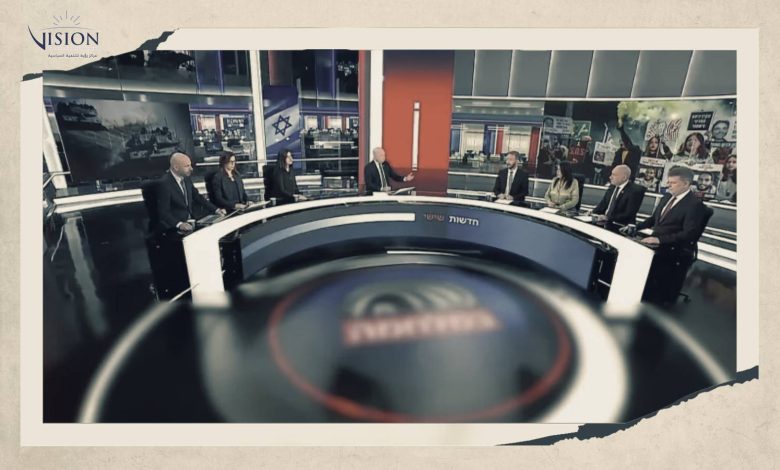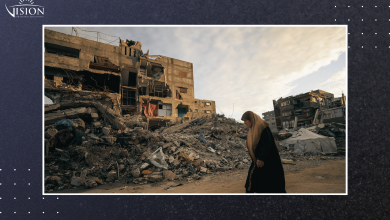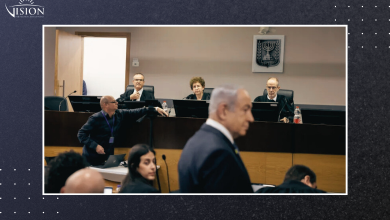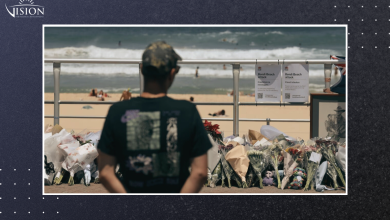Israeli Media During the War on Gaza: An Analysis of Military Censorship Authority

Kareem Qurt*
During the Israeli aggression on Gaza, Israeli media attracts considerable attention from Arab and Palestinian media, as well as from observers of the events. Despite the essential need to access news and information from these sources, certain critical considerations must be observed when engaging with them. One significant factor is the censorship imposed on Israeli media, where military authorities determine what can be published. This intervention intensifies during periods of escalation or war, underscoring the importance of this issue as it obscures the complete truths about events.
This report aims to illuminate the role of the Military Censorship Unit during the ongoing conflict in Gaza, along with other forms of censorship the occupation seeks to enforce on war coverage. It also examines the implications of Arab and Palestinian media relying on content from Hebrew media subjected to military censorship during the aggression.
Military Censorship on Media
The Israeli occupation inherited its military censorship system for the media from the British Mandate over Palestine. The “Press and Media Censorship” unit, colloquially known as “military censorship,” was established immediately after the creation of the state of occupation in 1948, drawing its powers from the Defense (Emergency) Regulations of 1945 issued by the British Mandate authorities. This unit operates under the Directorate of Military Intelligence (Aman) in the occupation army and is headed by a senior officer appointed by the Minister of War. Over the decades, the powers and operational mechanisms of the unit have evolved, undergoing various changes and reductions. Nevertheless, it continues to wield extensive authority over the censorship of media content, the publication of books, and the release of archival documents.
The Defense (Emergency) Regulations empower the military censor to “prevent the publication of any material whose publication would, or could, harm the security of Israel, public safety, or public order.” Israeli law requires journalists to submit all material related to security issues to military censorship for review prior to publication. According to a report by “Sikha Mekomit,” the definition of “security issues” is exceedingly broad, encompassing six densely packed columns of subheadings.
Censorship of Foreign Media
Military censorship activities extend beyond traditional and digital Israeli media to encompass foreign media. According to The Intercept, it is customary for foreign journalists to obtain permits affirming their adherence to censorship regulations. The Intercept acquired a document issued by military censorship to the foreign press at the onset of the war, prohibiting the publication of any material related to eight specific topics without prior approval from the military censor. These topics include:
1. Hostages: Any information regarding their status, health, or negotiations.
2. Military Operations: Nearly all details related to military operations, including troop deployments, movements, and locations of Iron Dome batteries.
3. Intelligence: Information concerning intentions or capabilities relevent to the enemy.
4. Weapon Systems: Details about weapons used by the army or those captured by the enemy, even if based on enemy reports.
5. Rocket Attacks: Information on rocket attacks targeting strategic infrastructure, such as power, water, and gas stations, transportation networks, military bases, and sensitive sites.
6. Cyber Attacks: Information on cyber attacks either against or launched by Israel.
7. Visits by Political and Military Leaders to Combat Zones.
8. Security Cabinet: Any leaks from its meetings prior to official publication.
While it may seem logical to prohibit discussion of certain topics for security reasons, other restrictions are politically and propagandistically motivated, such as those concerning the losses incurred.
Military Censorship in the War on Gaza
Military censorship interventions in media content typically intensify with every escalation, security event, or military operation. However, during the current war on the Gaza Strip, military censorship has reached an unprecedented record. According to a report by “Sikha Mekomit” and the Freedom of Information Movement, the four years preceding 2023 saw a notable decline in military censorship interventions in published materials. However, in 2023, there was a substantial increase in both the quantity and quality of military censorship activities, surpassing previous years significantly. The number of materials submitted to military censorship doubled from 5,916 in 2022 to 10,527 in 2023. Military censorship completely banned the publication of more than 613 materials, nearly four times the number in 2022, and intervened in the partial deletion of parts from 2,703 other materials, almost three times the previous year’s figure.
It is important to note that these figures cover only the year 2023 and do not include the subsequent months of war in 2024. This explosion in military censorship activity is concentrated in the last quarter of 2023, indicating that the number of interventions would be significantly higher when accounting for the extended months of war, which witnessed various security events across different fronts and levels.
A noteworthy qualitative development highlighted by the report is the physical presence of military censorship representatives in news studios to monitor their broadcasts and coverage of events. Additionally, their activities are not limited to traditional media but extend to social media platforms. Military censorship representatives actively scour media and social networks for any breaches of censorship restrictions.
Significantly, the owner of the “Hadashot B’Zman” channel on Telegram, a channel that enjoys a large following and popularity among both Israeli and Palestinian and Arab audiences, emphasized the censorship’s impact. The channel is regarded as reliable, with most scenes of intercepting resistance rockets or their impact on targets in both the north and south sourced from it. The owner repeatedly asserted that he complies with military censorship, acknowledging that his channel is full of what he described as “saboteurs.” He claimed to have deleted over 20,000 “saboteurs” in just one month, stating, “Fortunately, I am cautious and subject to censorship.” He also urged settlers on his channel to join his WhatsApp group, where he could publish more freely without the presence of “saboteurs.”
Efforts to impose media censorship are not limited to military censorship but also include other policies to withhold information beyond the Israeli sphere, extending to Palestinian territories, particularly the Gaza Strip. Since the beginning of the war, the occupation has barred foreign press from entering Gaza, citing security concerns. Additionally, the occupation forces have assassinated 141 journalists in Gaza alone since the war began up until last April, with many journalists wounded, including Al Jazeera correspondent Wael Dahdouh, whose family members were also targeted and killed. In southern Lebanon, occupation forces have assassinated journalists and wounded five others. In the West Bank, 66 journalists were arrested by occupation forces up until April.
Dimensions of Reliance on Israeli Media
The aforementioned data indicate a significant issue within Israeli media, necessitating extreme caution and vigilance in dealing with it. This calls for a reduction in the Palestinian and Arab rush to relay information from this media. The issue here pertains solely to its subjection to military censorship, which has peaked amid the ongoing war on the Gaza Strip. However, the Palestinian and Arab media landscape reflects the opposite. There is a pervasive rush to rely on Hebrew media, with extensive relaying of its content, whether traditional official media or social media platforms, treating it with high credibility. Consequently, many narratives promoted by Israeli media and the broader Zionist discourse since the war’s onset have become dominant in Arab and Palestinian political discussions.
Topics Promoted by Censored and Military-Directed Israeli Media
One of the themes that the Israeli media, under military censorship and direction, aims to promote—and which is often echoed by Arab media—is the framing of the war, its continuity, and development around the persona of Israeli Prime Minister Benjamin Netanyahu. Concurrently, it limits the Palestinian decision-making in war and negotiations to Yahya Sinwar, the head of Hamas in Gaza. Frequently, Israeli media reports claim that Sinwar has ceased communication with the external political leadership, moved locations, or surrounded himself with Israeli hostages. Such information contradicts the reality that the occupation has failed to locate Sinwar and other resistance leaders in Gaza nearly eight months into the war. How, then, could she possibly know any other details about him?
A critical issue likely subjected to strict military censorship is the material and human losses of the occupation during the current war, whether in Gaza, on the northern front, from daily drone attacks from Iraq and Yemen, or in the West Bank during confrontations with the resistance. Resistance forces consistently announce their operations and the resulting losses to the occupation, especially in Gaza and Lebanon, and some operations in the West Bank. However, the occupation’s official statements almost entirely deny any significant losses, admitting only minimal casualties. Resistance factions have often substantiated their claims with visual documentation of their operations and the inflicted damage. Nevertheless, the occupation frequently ignores these documents. Even when acknowledging casualties, the occupation rarely addresses its material losses, despite resistance factions providing substantial documentation of targeted military equipment.
This persistent denial has prompted spokespeople from the Al-Qassam Brigades, other resistance factions, and Hezbollah Secretary-General Hassan Nasrallah to address the issue in several speeches. Hezbollah released a video titled “By God, He Will Reveal What You Conceal,” showcasing documented attacks on occupation forces and direct hits. This situation has indeed created a credibility crisis, as most Arab and Palestinian media tend to accept the occupation’s narrative regarding its casualties, whether material or human, while ignoring the resistance’s documented statements. Consequently, the occupation’s version of events often prevails in the final analysis. This discussion does not aim to prove whether the occupation conceals its losses but to highlight that its narrative tends to be more accepted by Arab and Palestinian media, whereas the resistance’s narrative remains in limbo until corroborated by the occupation. This is inconsistent with the reality that Israeli media is subject to extensive military censorship dictating what can and cannot be published.
Conclusion
It is evident that military censorship plays a pivotal role in Israeli media, significantly impacting the war on Gaza by prohibiting the publication of certain information or excising parts of it. This censorship has contributed to misinformation, particularly affecting Arab audiences. Much information and detail can only be accessed through Israeli media, especially concerning Israeli political, military, and security matters. However, this requires careful consideration of the imposed military censorship and the occupation’s attempts to dominate the media narrative concerning the war on Gaza and its developments. The occupation seeks to isolate Palestinian, Arab, and foreign media from the scene through direct targeting, restrictions, or bans. These considerations necessitate caution for those engaging with Hebrew media, ensuring they are mindful of these factors. Otherwise, the occupation’s narrative will infiltrate and dominate. Palestinian political discourse, as has already occurred in certain aspects.
*Researcher at Yabous Consultancy and Strategic Studies Institute, Ramallah.





